您好,欢迎访问三七文档
1、1Unit1 FriendshipPeriod3 知识讲练课Step1 Wordsandexpressions:1.Youwillignorethebellandgosomewherequiettocalmyourfrienddown.你就不要理会铃声了,找个安静的地方去安慰你的朋友。【观察思考】1)Imadeasuggestionbuttheychosetoignoreit.我提了一个建议,但他们不予理会。2)Heignoredallthe“NoSmoking”signsandlitupacigarette.他无视所有“禁止吸烟”的警示,点了香烟。3)Hewasdrivingveryfastbecausehewasignorantofthespeedlimit.他车开得很快,因为他不知道要限速。4)Hisfailureresultedfromignorance.他的失败起因于他的无知。ignore是 ,whichmeans:1)topaynoattentiontosth.,意为“ ”;2)topretendthatyouhavenotseensb.意为“ ”;ignor。
2、ant是 ,意为“ ”;ignorance是 ,意为“ ”。【尝试运用】用ignore及其派生词的适当形式填空。1)Isaidhellotoher,butshe mecompletely.2)Iwas ofthefactthatthebosscouldbesostrict.3)Weareincomplete ofhisplans.4)He thedoctor’sadviceandgoesonsmoking.【观察思考】1)Wewaitedinsideuntilthingscalmeddown.我们待在室内,直到一切都恢复了平静。2)Hetookafewdeepbreathstocalmhimselfdown.他深深地吸了几口气,使自己平静下来。3)Keepcalmwhenindanger.身处危险时要保持镇定。4)Theysatintheyardtoenjoythecalmoftheevening.他们坐在院子里享受这夜晚的宁静。calm(sb.)down意为“ ”;calm也可用作 词或 词;keepcalm表示“ ”。【辨析】1)c。
3、alm指人时,表示镇静、平和的心情;修饰天气、海洋等时,表示风平浪静的“平静”状态。2)quiet指环境安静,没有声音,或是指人不吵闹,心里没有烦恼、焦虑。3)silent指人“沉默、不说话”或指环境“寂静的、无声的”。4)still意为“静止的;不动的”,着重强调人“完全不动;毫无声音”。【助记】Whenfacingdanger,oneshouldkeepcalm;whentakenphotos,oneshouldkeepstill;whensomeoneelseisasleep,oneshouldkeepquiet;inclass,oneshouldn’tkeepsilentabouttheteacher’squestions.一个人面对危险时,应该保持镇静;照相时,要保持不动;当其他人睡觉时,应保持安静;在课堂上,对老师的提问不应保持沉默。 【尝试运用】2用calm,quiet,still和silent填空。1)Pleasebe .Don’tmakesomuchnoise.2)Stand 。
4、 whileItakeaphotoofyou.3)WhateverIaskedhim,Kerrystillkept .4)Wemustbe inanemergency.5)Afterthestorm,theseawas .2.Orareyouafraidthatyourfriendwouldlaughatyou,orwouldnotunderstandwhatyouaregoingthrough?你是不是担心朋友会嘲笑你,会不理解你目前的处境?【观察思考】1)Howdoesshekeepsmilingafterallshe’sgonethrough?她经历了这一切后怎么还能满脸笑容?2)Ialwaysstartthedaybygoingthroughmymails.我总是每天一早就仔细查阅我的邮件。3)Theplandidn’tgothroughtheCEO.这计划未被CEO接受。4)Hehasgonethroughallhismoneyforhisillness.他因病而花光了所有的钱。“gothrough”means“toexperienceorsuffersth.”。
5、,意为“ ”,无 语态。【尝试运用】1)Thepolice thebuilding,hopingtocatchthethief.A.lookedfor B.settleddownC.foundoutD.wentthrough2)Whenwearegettingexcited,angryorscared,ourbodiesalso manyphysicalchanges.A.gooverB.goaroundC.gothroughD.gofor3....Istayedawakeonpurposeuntilhalfpasteleveninordertohaveagoodlookatthemoonbymyself.……直到11点半,我故意不睡觉,为的是独自好好看看月亮。【观察思考】1)Hecamehereonpurposetotellyouthetruth.他来这儿专门告诉你真相。2)Inordertocatchupwithothers,youshouldtryharder.为了赶上别人,你应更加努力。3)Hehidhimselfamongthetrees。
6、inordernottobecaught.为了不被逮住,他藏在树林中。onpurpose意为“ ”,与purposely同义;inordertodosth.= , 一般不用在句首,其否定形式为 ,在句中作 状语。【尝试运用】1)他们去北京参加一个重要会议。TheywenttoBeijing .2) lateinthemorning,Bobturnedoffthealarmclock.A.SoastosleepB.SleepingC.TosleepD.HavingsleptStep2 Sentencestructureswearegoingtolearn1.Whilewalkingthedog,youwerecarelessanditgotlooseandwashitbyacar.溜狗的时候,你很粗心让它松扣了并被车撞了。【观察思考】1)Hefellasleepwhile(hewas)doinghishomework.他做作业时睡着了。2)When(hewas)laughedat,hewantedtocry.当他被嘲笑时,他想哭。3whilewalkingth。
7、edog=whileyouwerewalkingthedog。本句中while后面省略了主语you和be动词were。由此可见,when或while引导的时间状语从句,如果从句中的主语和主句的主语一致时,且谓语含有be动词,可省略从句中的主语和be动词。【尝试运用】While inthecountryside,hemademanyfriendswiththenativethere.A.workedB.workingC.heworksD.heisworking2.Iwonderifit’sbecauseIhaven’tbeenabletobeoutdoorsforsolongthatI’vegrownsocrazyabouteverythingtodowithnature.我不知道这是不是因为我长久无法出门的缘故,我变得对一切与大自然有关的事物都无比狂热。【观察思考】1)ItwasyesterdaythatImetAnninthestreet.我是昨天在街上遇见安的。2)Itishewhoisgoingtospeakattheschoolmeeting.是他要在校会上发言。3)Itw。
8、asinthestreetthatImetmyoldfriendyesterday.昨天我是在街上碰到了我的老朋友。4)Wasityouthat/wholetoutthesecrettoher?是你把这个秘密泄露给她的吗?本句含有Itis/was+被强调部分+that/who+其他成分的强调句型。强调句型可对句中的主语、宾语、表语、状语等进行强调,若强调的是人,后面的that也可用who代替。如:ImetLiMingattherailwaystationyesterday.昨天我在火车站遇到了李明。1)ItwasIthat/whometLiMingattherailwaystationyesterday.(强调主语)2)ItwasLiMingthat/whomImetattherailwaystationyesterday.(强调宾语)3)ItwasyesterdaythatImetLiMingattherailwaystation.(强调状语)【尝试运用】1)Idon’tmindhercriticizingme,but ishowshedoesitthatIamagainst.A。
9、.it B.that C.this D.which2)Itisnotwhoisrightbutwhatisright isofimportance.A.whichB.itC.thatD.this3....itwasthefirsttimeinayearandahalfthatI’dseenthenightfacetoface...……这是我一年半以来第一次目睹夜晚……【观察思考】1)Itisthefirsttimethattheboyhasgonehomealone.这是那个男孩第一次单独回家。2)Thiswasthefourthtimeshehadrungyouinaweek.这是她一周内第四次给你打电话。3)ThatwillbethetenthtimethatIhavevisitedBeijing.那将是我第十次参观北京。It/This/Thatisthefirst(second,third...)timethat主语.have/has/haddonesth.是一常用句型,意为“某人第一(二、三……)次做某事”。从句中的时态须用完成时态。【。
10、尝试运用】1)It’sthefirsttimethathe (write)aletterinEnglish.2)—Doyouknowourtownatall?—No,thisisthefirsttimeI here.A.wasB.amcomingC.cameD.havebeen4.Anothertimefivemonthsago,Ihappenedtobeupstairsatduskwhenthewindowwasopen.还有一次,就在五个月以前的一个黄昏,我碰巧在楼上,窗户是开着的。4【观察思考】1)Shehappenedtobeoutwhenwecalled.我们打电话时她刚巧不在家。2)Youdon’thappentoknowhisname,doyou?你不会碰巧知道他的名字吧?3)Ithappenedthatshewasoutwhenwecalled.我们打电话时她刚巧不在家。happentodosth.=todoorbesth.bychance,表示“碰巧做某事”,它等于It(so)happenedthat...。如:Ihappenedtobeoutwhenhecal。
 三七文档所有资源均是用户自行上传分享,仅供网友学习交流,未经上传用户书面授权,请勿作他用。
三七文档所有资源均是用户自行上传分享,仅供网友学习交流,未经上传用户书面授权,请勿作他用。
 234页
234页
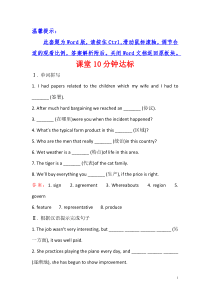 3页
3页
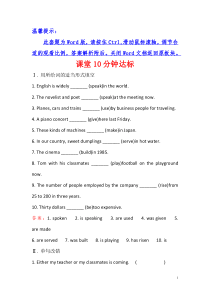 5页
5页
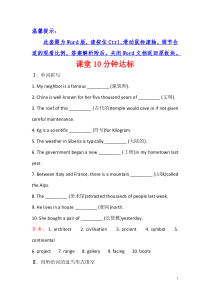 3页
3页
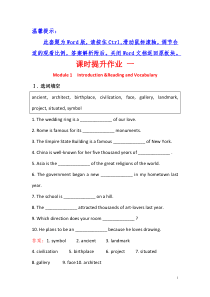 11页
11页
 3页
3页
 11页
11页
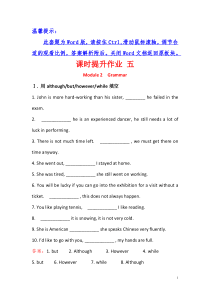 9页
9页
 10页
10页
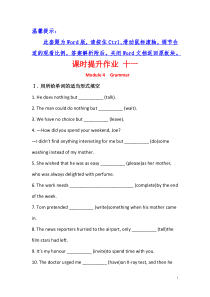 10页
10页
本文标题:2017-2018学年高中英语人教版必修一学案设计:Unit 1 Friendship 1.3 Wo
链接地址:https://www.777doc.com/doc-1943695 .html